
By QUINTON SMITH/YachatsNews.com
and CHRISTIAN WIHTOL/The Lund Report
The willingness of Oregonians to try to stem COVID-19 cases started Wednesday when residents and visitors in Lincoln County and six other jurisdictions came under a state requirement to wear face coverings in public.
But it was a backlash to a week-old county directive that overshadowed implementation of the state order in Lincoln County.
Lincoln County instituted its own, voluntary directive last week asking people to wear masks in public but amended it Wednesday after a fierce backlash developed after a story and video Tuesday on the New York Post’s website which was picked up by conservative commentators and websites — and a tweet from Donald Trump Jr. — focusing on the directive not applying to racial minorities if they feared profiling or harassment.
County officials said they were stunned at hundreds of racist, abusive and vile calls, emails, Facebook messages and tweets they received Tuesday and Wednesday, even setting up a special call center phone line to handle them. There were also veiled death threats.

“It’s been overwhelming,” said county spokesman Casey Miller, describing many of the calls as long, angry and profane. “It’s brutal. It beats anything I’ve ever seen.”
Lincoln County changed its directive Wednesday to match the governor’s, removing the exception for people of color.
Miller said the scrapped exception was a well-intentioned way for people worried about racial profiling to not wear a mask.
“I thought it was mindfully crafted. The focus of the directive was really on the health aspect,” he told the Salem Statesman-Journal, which came out when the county was experiencing a spike in coronavirus cases after an outbreak at a Newport seafood processor.
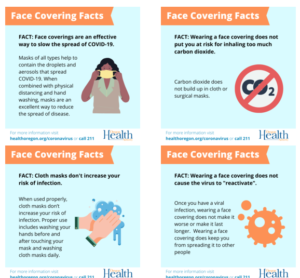
With mask requirements becoming more common, activists have raised concerns that the directives could put non-white people in danger. But the directive apparently had the opposite effect, sparking a torrent of angry phone calls and messages locally and across the country.
Wednesday afternoon the county commissioners and department heads issued a two-page statement explaining why they included the provision excluding people of color last week and why they changed the directive.
“We included the protection for those within our communities of color who historically, and often personally, found themselves the victims of harassment and violence,” the statement said. “After last month’s protests, the national attention given to issues of racism, police tactics and inequity, we felt this exception would be embraced and understood as a small effort to start addressing the realities some of our neighbors deal with on a daily basis.”
County officials said they were “shocked and appalled at the volume of horrifically racist” comments they had received and that it had created “a ripple of fear” among minority groups in the county. “The very policy meant to protect them, is now making them a target for further discrimination and harassment,” the statement said.
As a result, and with the urging of minority leaders, commissioners said the directive was changed because it “was not providing them protection, but instead making them possible targets for more hate.”
“While shocking, it did not surprise us to receive racist calls from elsewhere in the county … because that is where we tell ourselves the world’s problems are right? Well that is not completely true,” the statement said. “We were surprised by the number of derogatory calls and emails received from our very own coastal communities.”
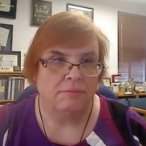
On Thursday Commissioner Claire Hall pushed back on social media comments that commissioners didn’t take responsibility for its mistakes.
“I want to step up on that right now,” Hall said on her Facebook page. “This is a classic case of good intentions gone wrong. We didn’t consider a lot of things, like direct outreach to local communities of color, the possible backlash effect … This is a decision we made quickly and we should have hit the pause button before acting,”
The governor’s directive and local enforcement
The mandate by Gov. Kate Brown requires customers to wear face coverings at stores, in gyms, on public transit, at barber shops and hair salons and in shopping malls. They are not required in restaurants or bars while eating or drinking or at pools while swimming.
The order puts Lincoln, Multnomah, Washington, Clackamas, Hood River, Marion, and Polk counties in line with the fast-swelling ranks of cities, counties and states around the country where officials are imposing mask requirements in most indoor public spaces.
Brown picked the seven counties because of their rapidly rising number of COVID-19 cases. Lincoln County officials asked to be included in the order before it was announced last week.
Businesses will be able to refuse entry to people who don’t wear a mask.
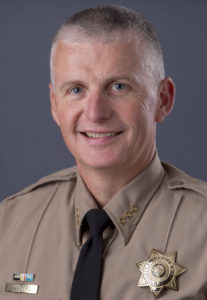
Lincoln County Sheriff Curtis Landers while the governor’s executive order carries the potential of a misdemeanor citation and $1,250 fine, he doesn’t expect there to be many issues and hopes there are not many calls reporting cases to the regional dispatch center.
“The things that we’re most concerned about is the fallout … a customer entering a business without a mask, the business owner asking them to leave” and then an escalation, Landers said. “If somebody absolutely demands a deputy come out, then we will.”
Instead, the sheriff said deputies will have a supply of masks with them to hand out to business owners and customers.
“We try to solve the problem and not make it a bigger one,” Landers said.
The sheriff’s emergency management department also announced Thursday that it would be supplying masks it recently received from the state of Oregon to chambers of commerce from Yachats in the south to Lincoln City in the north. Beginning Monday, businesses will be able to order masks from individual chambers for their employees and customers.
It also announced it will have another mass distribution of masks Tuesday at locations around Lincoln County.
Officials under pressure to open, keep people safe
Elected officials are resorting to face covering orders because they’re under a dual pressure.
To revive their economies, they are relaxing the initial severe pandemic lockdowns. Yet at the same time, they are alarmed by continued spiking of cases to record highs. In Oregon, they’re surging.
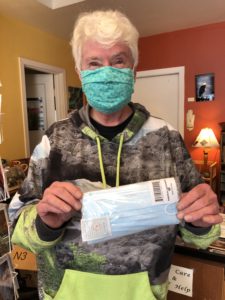
“There is still no vaccine, there is no reliable treatment for this virus,” Multnomah County health officer Dr. Jennifer Vines told The Oregonian/OregonLive, “so prevention is still going to be the key for the next several months.”
Vines and other health officials think masks are a key component to prevention as people expand their spheres of operation and the economy reopens.
Widespread mask use, especially by shoppers and others in public, is a straightforward way to slow the spread of the disease while letting businesses function, experts from the World Health Organization and elsewhere say.
But mask mandates can trigger a host of problems: Will people comply? Will they be openly defiant or exploit exemptions, for example for people with a medical disability that precludes them from wearing a mask? Who, if anyone, will enforce the mandates? What will be the penalties?
Masks have become a political flashpoint, Seth Gillihan, a clinical assistant professor of psychology in the Psychiatry Department at the University of Pennsylvania, wrote on the Psychology Today website.
“Face masks are tied to the political conflict over our response to the coronavirus,” he wrote last month. “Those who lean left politically tend to see the virus as a more dire threat; those on the right are more likely to downplay its seriousness.’
Masks trigger feelings of “us versus them,” dividing people who wear masks from those who don’t, he wrote “Conflict over masks is likely to continue as the debate over how and when to reopen the country intensifies.”
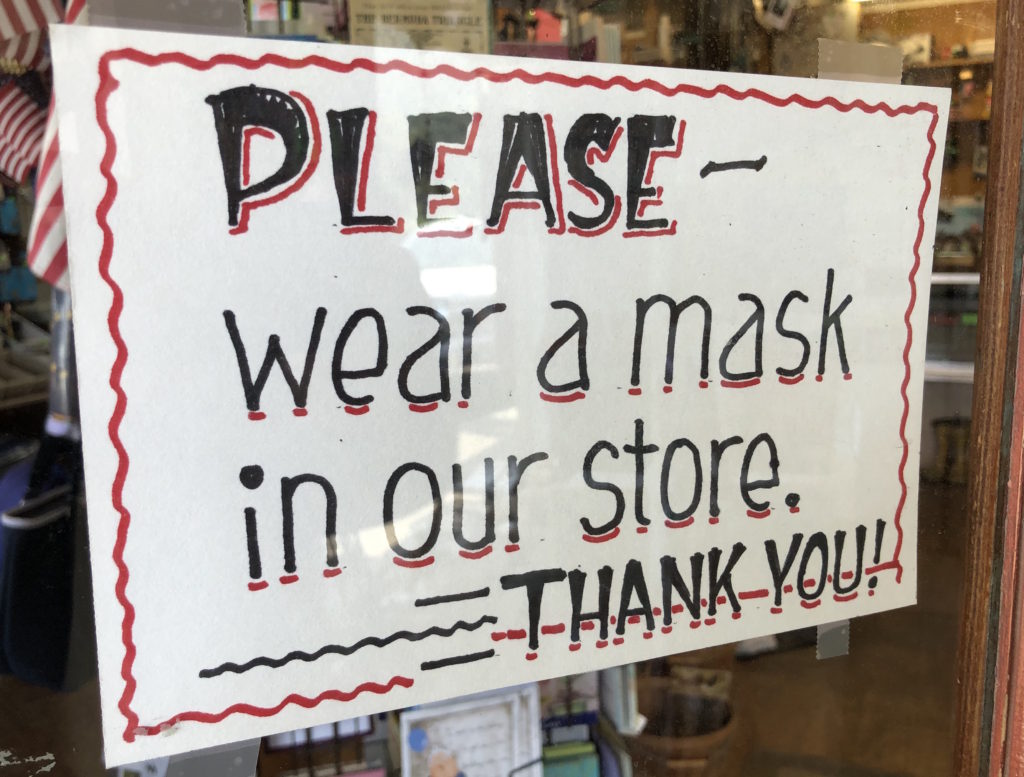
Resistance common in U.S. and Europe
In the United States, from the White House on down, a schism quickly opened up over masks. President Donald Trump refuses to wear one. They were handed out for free at his rally last Saturday in Tulsa, but most attendees didn’t put them on. Yet an ever-swelling number of governments and businesses are imposing mandates.
California Gov. Gavin Newsom, a Democrat, has enacted an immediate statewide mask requirement on indoor shoppers, as well as people outdoors who are not 6 feet apart. That immediately sparked a backlash from some officials.
Newsom has taken a non-confrontational approach thus far, saying he preferred “persuasion” to enforcement.
“We’re not looking to fine people. We’re looking to educate people, encourage people,” Newsom said. “And to the extent that people flout and abuse, which may be the exception, then we have many tools in the tool kit.”
In the state of Washington, Gov. Jay Inslee resisted imposing mask mandates until last weekend, when he directed retailers in Yakima County — a COVID-19 hot spot — to bar customers who fail to wear a mask.
Oregon fails to address enforcement
Brown has sidestepped the issue of enforcement, saying that with her mask order she is “encouraging, cajoling, asking every Oregonian to be kind and to be smart.”
Brown’s order requires businesses to make sure customers wear masks, with a few exceptions, such as when they are eating or drinking in restaurants or other similar venues.
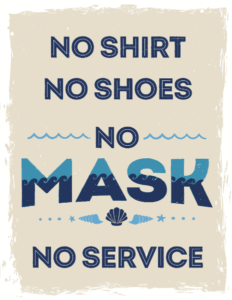
Customers don’t have to wear a mask if they have “a medical condition that makes it hard to breathe when wearing a mask,” or if they have a “disability that prevents the individual from wearing a mask,” the Oregon Health Authority said. Children under 12 are exempt from the order.
“Masks are recommended in situations where you encounter people outside of your immediate household members,” Dr. Paul Cieslak, senior health adviser to the Oregon Health Authority, told The Oregonian/OregonLive in May, “because by wearing them, you could reduce the likelihood of transmitting COVID-19 if you are carrying it unawares.”
So wearing a mask, officials say, is a way to protect your community, because you may be a carrier and not know it.
Oregon officials are hoping they have public sympathy on their side.
“Face covering requirements have been mandatory for employees of many businesses since the reopening process began in mid-May,” Brown spokesman Charles Boyle told The Lund Report. “Now, it is incumbent upon members of the public to also abide by the requirement to wear a face covering, while indoors and interacting with others in these spaces.”
“We are encouraging businesses to make face coverings available to customers when possible, and are working with them as they develop their own policies to implement this guidance,” Boyle wrote in an email. “Under the governor’s executive orders, businesses and individuals not following this guidance could be subject to penalties, but, in order to best protect Oregonians from the spread of this disease, our focus is on education and seeking voluntary and widespread compliance to the greatest extent possible.”
So far, Oregon has been relatively lucky. Although COVID-19 cases have skyrocketed since counties started peeling back restrictions, the state has relatively few cases and deaths per capita compared with some other states. It now has more than 7,000 cases — only 11 states have fewer according to the Centers for Disease Control and Prevention — and fewer than 200 deaths.
Brown and health officials hope to prevent a crisis. But just how the mask mandate will play out in Oregon remains to be seen.
The state’s urban areas covered by the new masking requirement are largely liberal, politically, and many residents may agree with the governor’s order. But getting everyone to comply may be another matter.
Some people are angry about the mask-requirement, arguing that it interferes with their personal rights.
“It’s safe to say we have been receiving a wide range of feedback from Oregonians on face coverings, negative and positive,” Boyle told The Oregonian/OregonLive.
While many have expressed support for the governor’s rule, others have called it illegal, an impingement on personal freedom, and cruel to disabled people and those who have had traumatic experiences involving gagging. In reality, it is unlikely that anyone will be punished for not wearing a mask. Enforcement of the rule will vary by county, but most efforts will focus on education.
— Christian Wihtol: christian@thelundreport.org
YachatsNews is a subscriber to The Lund Report, a Portland-based nonprofit that covers health and the medical industry in Oregon.



Wow, white people making bad decisions for people of color who are affected disproportionately by Covid-19. Good intentions making minorities targets.